CFDT delegate Charles Piaget (c) takes part in a demonstration by employees of the watchmaker Lip against the closure of their factory, on September 7, 1973 in Paris (AFP/-)
“We manufacture, we sell, we get paid!”. 50 years ago, the employees of the Lip watch factory took control of their bankrupt factory, in a totally unprecedented episode of post-May 1968 self-management.
In the Palente district of Besançon, the remaining soulless industrial buildings no longer bear any trace of those Roaring Twenties when the big letters “It’s possible!” were displayed.
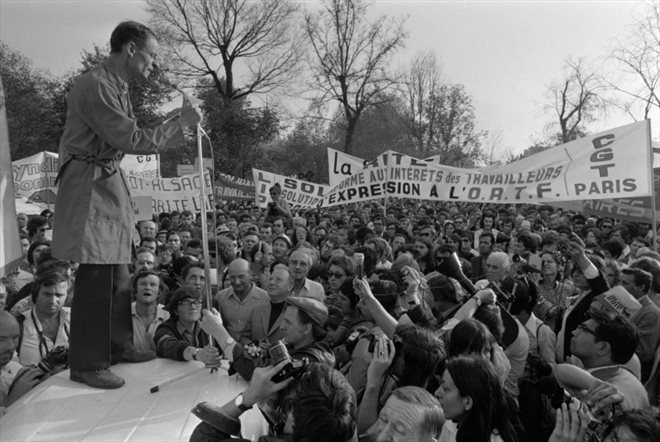
CFDT trade unionist Charles Piaget (l) speaks to employees of the watchmaker Lip during a demonstration against the closure of their factory, on September 7, 1973 in Paris (AFP/Archives/-)
“We marked working-class history in a masterful way, it woke up,” enthuses Roland Vittot, 90, again. Postcards and period photos in his library confirm that this social conflict, which took place over several years, “marked our lives”.
Figure of the movement a little in spite of himself, Charles Piaget, 95 years old and still cantor of the “collective”, dates the “triggering” of the movement to April 17, 1973: more interested in the brand than in the production tool, the Swiss shareholders of Lip file for bankruptcy and the boss resigns.

Charles Piaget, former CFDT union leader of the watchmaker Lip, on January 14, 2023 in Besançon (AFP/Archives/ARNAUD FINISTRE)
“There was no one left to lead, so it was a situation that was going to get worse,” recalls the former CFDT union leader, who joined Lip in 1946.
To avoid the loss of wages from a strike, the production rate is deliberately slowed down.
– War Chest –
But on June 12, it is the blow of anger when the temporary administrators announce the liquidation and the dismissal of the thousand employees.
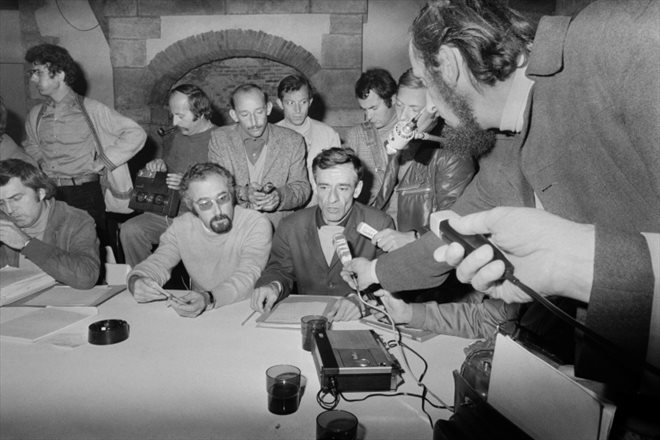
CFDT trade unionists Roland Vittot (g) and Charles Piaget (d) during a press conference on October 1, 1973 in Besançon (AFP/Archives/-)
The sequel takes an incredible turn: kidnapped administrators, a war chest of watches hidden around Besançon, a factory occupied by its employees, wild sales organized throughout France, bags of money transported by train to a Parisian bank.
But also nights of reflection and some 200 general meetings.
“If we registered with the ANPE (ancestor of Pôle emploi, editor’s note), with a different situation for each of us, we could not continue to fight together”, recalls Charles Piaget, evoking a “ten days” before deciding that there was “no other solution than to manufacture, sell and pay oneself”.
“It was out of the ordinary, we wondered if it was possible”, continues the former mechanic-toolmaker, spinning the metaphor “of the sailors who revolt because the captain is a bastard, but, who, once masters of the boat, cannot read a map”.
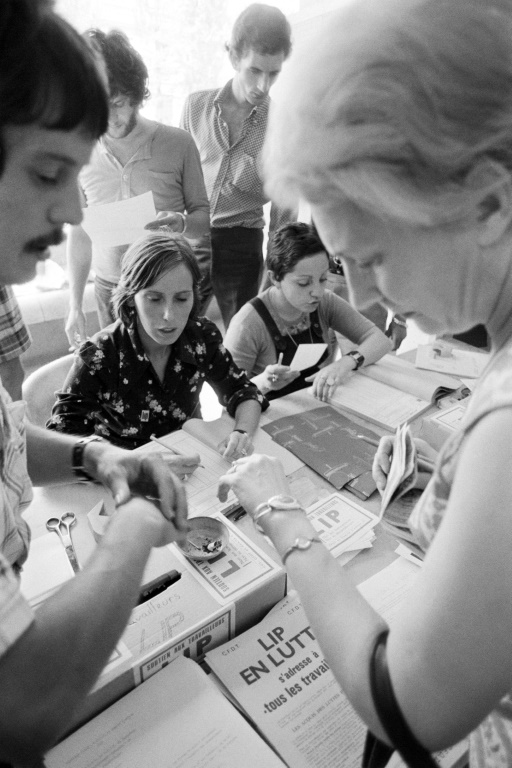
Employees of the watchmaker Lip sell watches in the canteen of the Ministry of Industry and Scientific Development, on August 14, 1973 in Paris (AFP/Archives/DANIEL JANIN)
Until the moment when “the workers of the chain came to yell at us sharply” by saying: “But finally, you believe that it was the head who made the quality? You believe that it was the head who made the output? Those who did the job, it was us and we can guarantee you that we will do quality,” says Charles Piaget. “And there, we started”.
The Lip revolt resonates in post-sixty-eight ears in France and even internationally. On September 29, 1973, 100,000 people marched in Besançon.
– “Subversive idea” –
“What strikes the public is this + active + strike, this + reverse + strike where the strikers work. They take over their factory and experience a different relationship to work”, explains Frank Georgi, professor of History contemporary at the University of Évry (Paris-Saclay), emphasizing “the instinctive sympathy for these courageous + outlaws +, who fight for their jobs and their dignity”.
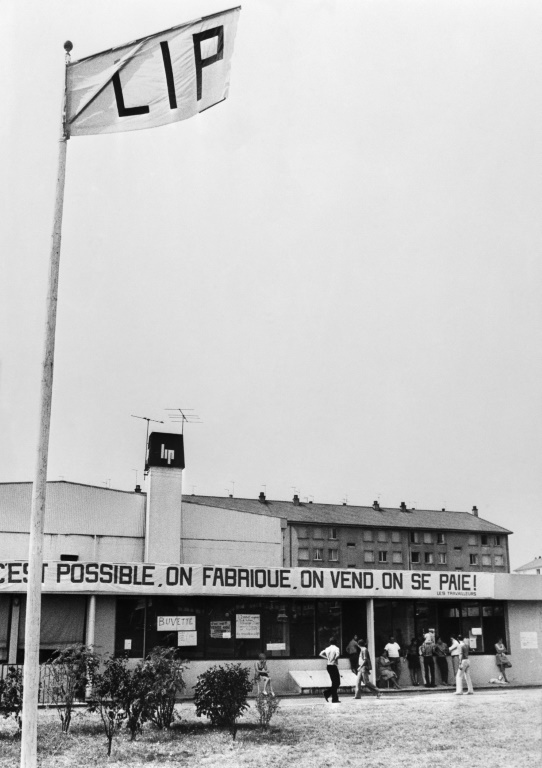
A banner “It’s possible, we make, we sell, we pay!” on the facade of the Jean Zay gymnasium occupied by LIP employees, on August 28, 1973 in Besançon (AFP/Archives/-)
Having become “the very symbol of self-management”, Lip “appears to some of the heirs of May-68 as a laboratory, as a breach opening onto this other dream society”, develops the historian.
Founded in 1867 by Charles Lipmann, Lip, in the 1960s, represented the excellence of French watchmaking and manufactured 300,000 watches a year. The last of the founding family, Fred Lip, was driven out of the company in 1971.
“Throughout France, the Lip watch was very well known, it was the watch that we offer at communion and at different times in life”, insists Roland Vittot, a watch by designer Roger Tallon always on the wrist. His watchmaker’s magnifying glass is now used to compensate for a declining view to observe period photos.
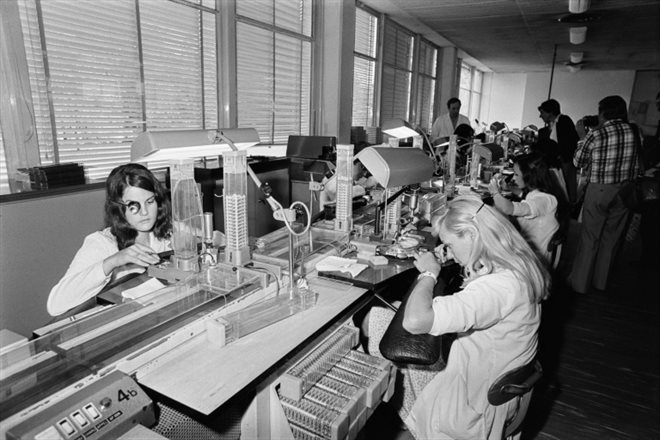
Employees of the watchmaker Lip work on the assembly and quality control of watches, in June 1974 in Besançon (AFP / Jean-Claude DELMAS)
The workers will manage themselves until a rehiring agreement in the spring of 1974 under the leadership of Claude Neuschwander.
Two years later, another filing for bankruptcy and a new episode of self-management, for lack of a buyer, before the creation of a Scop in 1977, until the mid-1980s.
After various adventures, the Lip factory of the time disappeared, but the brand set foot again in 2015 in Besançon, where the watches are again assembled.
If it inspired other “self-management conflicts” in France and abroad in the following years, according to Frank Georgi, this earthy self-management did not save Lip.
Was it a failure so far? “Yes”, replies bluntly Charles Piaget, whose union spirit is still just as strong half a century later. “But still, it’s an idea that got in the way, a subversive idea.”
© 2023 AFP
Did you like this article ? Share it with your friends with the buttons below.




